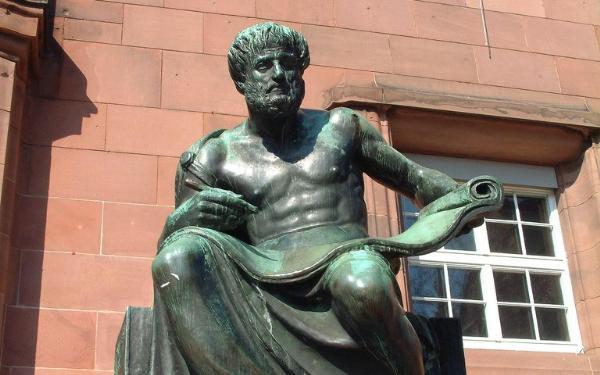Joe Egerton imagines the letter that Aristotle - after a little help from St Thomas Aquinas and St Ignatius - might write to the Prime Minister about his handling of the financial crisis.
Dear Prime Minister
Please don’t be alarmed at a missive appearing in your Inbox from somebody who has been what you call dead (and we call truly alive) for the last two thousand three hundred years. You may not think of me as the most obvious source of advice as you try to steer the country through the financial crisis, but let me offer you some food for thought. A number of us talk earthly developments over and I have learned from those who have arrived after me – as you will see from the four propositions that I now offer for your consideration, Thomas Aquinas and Ignatius of Loyola have especially enriched my own thinking.
First proposition – Greed is not the cause
It is a large error to regard the crisis in the financial system as caused by “greed”. Greed is the name of a particular type of desire, a particular motive for the activity of acquisition, the activity of obtaining more. To cause the crisis, people had to do things. They had to move from having an inordinate desire to putting it into effect. Ignatius pointed out that he had discussed this in his Spiritual Exercises[1]: when an evil thought comes to me, “I can sin venially by dwelling on it slightly, or admitting some pleasure in the senses, or when I am somewhat slack in repulsing the thought”[2]. Then “I can sin mortally in two ways. The first is when I consent to the bad thought, intending to carry it out if that is possible. The second is when one actually carries out the sin. This is graver… through [the] greater harm [it causes] to other persons.”[3]
Ignatius explains why greed may be a motive but it cannot be the action that causes a crisis. As he says, you need action to do harm – and harm certainly has been done. What was this action that caused the crisis? I say it must have been the activity of seeking more. Eudemus’s[4] note of what I said in my course on Personal and Spiritual Development[5] all those centuries ago is absolutely correct – but there has been a difficulty in translating the Greek. There is no exact equivalent in Latin or English for the words I used – pleonexia to name the defect opposed to the excellence or virtue of justice or integrity, and pleonektikos as the adjective applied to the one who lacks integrity[6]. Pleonexia is simply the activity of acquiring more. I did explain what I meant. I said that the unjust person[7] is pleonektikos, that is somebody who is going round the place always acquiring more good things – or avoiding bad things.[8]
Thomas Aquinas carefully explained exactly what I said in his Commentary [9] and then went on to take exactly the same position that I did in the Summa Theologiae. Because he did not have Latin words that exactly corresponded to the Greek words, he spelt out what he considered injustice to be[10] in the very terms I used. Thomas – according to his English translators - at various points uses covetousness to label this vice. It is highly instructive that that Thomas distinguishes between “covetousness” and “the daughters of covetousness”[11], a series of gravely wrong actions, including violence, perjury and fraud. To these Thomas added treachery, citing as an example Judas’s betrayal of Christ for 30 pieces of silver.
What caused the financial crisis was pleonexia – the activity of acquisition, not just by the bankers but, as far as I can see, by most of the western world; people were borrowing huge amounts to acquire. Of course as they did so – Thomas is quite right to point to the daughters of this vice of acquiring – some did all sorts of other wrong things as well. But only a tiny amount of the damage was done by fraud, and even less by violence. The damage to the system was done by nearly everyone trying to acquire.
Second proposition – Economic growth is not an end in itself
The belief that a systematically higher standard of living is always to be preferred to a systematically lower standard of living is incompatible with a just society. Since inordinate acquisition was the underlying cause of the crisis, abandoning acquisition is an essential step to avoiding a repeat.
I recognise that growth is an important feature of your 21st century western society. Hobbes[12] claimed that human happiness consisted in the obtaining of power, by which he meant possessions. Of course if you think (as he did) that humans are individuals and society is an artefact – that there is no such thing as society – you will get a result like his. But on this he was simply wrong[13]. Human beings cannot exist outside a social order – we are animals dependent on one another. Without society, human beings cannot exist at all – there might be a two-legged animal without wings but without society it could not be a human. And justice is the cardinal virtue of any society.
For some centuries, of course economic growth was desirable for the construction of a society in which all members of that society could enjoy a secure life in which each had the opportunity to become a full person; and that must be true of parts of the world still. (You will see that I have learned from Thomas that my ideas about the virtues can be applied to the whole human race, not just a tiny elite.) But growth cannot be an important good for Britain, or indeed the developed West. A few moments reflection on what Mr Ed Miliband[14] announced about the need to reduce output of greenhouse gases by 80 per cent in 42 years would tell you that the days of economic growth are over. Certainly, with a growing number of dependent elderly people, the idea that creators of wealth will not have to make sacrifices to sustain them is manifestly absurd. And equally it is impossible for the planet to sustain the population by 2050 without restraint by individuals in the rich West. Mr Andrew Lansley’s recent thoughts on the need for responsibility were not just a call to self-restraint for one’s health[15], they were also a call to justice. Thomas went quite pale at Mr Lansley putting the need to eat smaller meals on such an obviously Thomistic basis – until he remembered that happily there is in Heaven neither a shortage of good things nor any harm arising from them!
There really is no alternative to giving up systematic acquisition of possessions as a main goal of your society if a series of disasters are not to result. In this respect, you may find it helpful to look closely at the reflections of Adam Smith, that great alumnus of Kirkcaldy Burgh School, in Part IV of The Theory of Moral Sentiments. Adam Smith quite rightly emphasises the benefits of tilling the earth and developing industry for the human race as a whole. The problem arises with his account of how humans come to do these things: they are driven by a desire to acquire. In a characteristically honest examination of his own doctrines as set out fully in the Wealth of Nations, he observes in The Theory of Moral Sentiments that this desire leads individuals into ridiculous and self defeating excessive acquisition. I offer one short quotation: “It is well that nature imposes on us in this manner. It is this deceptionwhich rouses and keeps in continual motion the industry of mankind…” (Emphasis added).[16] Deception is, as Thomas observes, the root cause of tragedy. And tragedy is what will assuredly happen if you pursue growth.
This is not of course to deny the importance of economic activity, nor to deny that you had to act as you did to prevent the cessation of activity through the collapse of the banking system. What I do deny is that unlimited economic growth is a good. I discussed this in my course on Politics, drawing a distinction between economic activity designed to meet the genuine needs of a household or a society, and economic activity aimed at acquiring more than is needed.[17] True wealth has a limit of size, determined by the purpose of the association it serves; and the amount of property that suffices for the good life is not unlimited.
Third proposition – Lower house prices are preferable
The belief that high house prices are to be preferred to lower prices is a large and dangerous mistake. In the Politics, I compared this sort of prayer – for high house prices – to that of Midas in the fable, where everything before him was turned to gold at once through the granting of his own avaricious prayer.[18] He starves in the midst of great wealth.
It is of course good that families should live in comfortable homes. But the purpose of a house is to provide a home. It is not to make money.
Consider what a Britain with lower house prices might look like. First, families that acquire a family home might not be under quite so much financial pressure, and might also have spare money with which they could make such desirable improvements as increasing insulation. Second, consider one of the causes of high house prices – single occupancy, which increases the demand for houses and flats. If there were less single occupancy, house prices would be lower. In such a scenario, young adults would, when it fitted their occupations, live at home longer; over-seventies might well share a house with the next generation; families would mean more than a couple and, if they had them, young children. This would be reflected in a reduction in the consumption of energy overall. Systematically lower house prices would mean less variation between the higher and lower ends of the market, so the benefit of being the son or daughter of owners of a home in “good” areas would diminish, and there would almost certainly be fewer people with substantially higher than average wealth, and fewer with substantially lower than average wealth. From a social, environmental and demographic perspective, a Britain where house prices were systematically lower might be rather more attractive than one where they were systematically higher.
Lower house prices would also facilitate non-usurious means of financing homes. In the Politics, I characterised usury as “the most unnatural of the modes of acquisition”[19]. In the Summa, Thomas, who agrees with my arguments against usury[20], also comments on Yahweh’s prohibition of usury in Deuteronomy. He observes that as we are now to regard all humans as our neighbours, this prohibition has, in the new law, universal application[21]. Thomas has important observations on the application of this ban to homes – these he considers it proper to rent and to sell; and this suggests that some variant of Islamic finance (where interest as such is not charged) might provide a more just system for financing home ownership. If house prices are fairly stable, a system of progressive transfer of ownership becomes easier.
Fourth proposition – Rules do not provide all the answers
Rules cannot provide for every eventuality. First, in politics and ethics, rules tend only to hold generally and for the most part[22]. Second, there cannot be rules for deciding which rules are appropriate – for that would create an endless regress, which would be absurd. There are situations in which no rule can tell one what to do.
The current financial crisis provides an instructive example of the folly of rules, rules, rules. There is no suggestion at all that most of the banks – and certainly none that the major banks – failed to comply with the capital adequacy rules as they stood. By the time the government had announced substantial investment in banks, and RBS, Lloyds TSB and HBOS had announced that they would apply for this investment capital, the FSA had already required the banks to apply tests more rigorous than the rules required.
The banking crisis seems to have arisen from a number of errors, few or none of which could have been adequately prevented ex ante by rules – except of that type one finds in The Spiritual Exercises, which really are more in the form of suggestions as to how one can determine whether a particular choice is likely to enable the chooser to live a good life or otherwise. Good examples of an “Ignatian rule” the advice to imagine myself at the point of death, and ask what I would wish to have chosen[23]; or to see myself appearing at the judgment day, with the same question[24].
It would be a bad mistake to assume that a plethora of detailed regulatory rules can protect the people from errors by bankers. What is required is a recovery of the concept of a morally directed skill, a techne, and its place in a hierarchy of activities and skills[25]. Bankers need to abandon the idea that they are “masters of the universe” and recognise that in a well functioning society, their role is to service industry, rather than the reverse. The same is of course true of ministers of the crown; their proper role is that of servant of the state.
The idea that being a servant is good is not one that I advocated in my courses all those centuries ago. I have learned from Augustine[26], Thomas and Ignatius that humility does have an important part to play. But I still maintain that formation is essential, and that intellectual and technical excellence is impossible without what you would describe as moral excellence. Perhaps a year’s novitiate, including a thirty-day silent retreat for the Exercises and a full reading of the Summa, tested by a requirement to comment on short selected passages, should be a condition for seeking Approval from the FSA as fit and proper to serve as a director of a bank.
Yours sincerely,
Aristotle
Joe Egerton has worked in financial regulation since 1985 and ran a course on Aristotle with a little help from Aquinas for the Mount Street Jesuit Centre.
[1] I am using the translation by George E Ganss SJ of the Institute for Jesuit Sources; references are preceded by EXX.
[2] EXX 35
[3] EXX 36-7
[4] The reference that follows is to fifth book of the Nicomachean Ethics (EN V) – a set of notes of a course on Personal Development given by Aristotle attributed to Nicomachus; but most modern scholars regard EN books 5 to 7 as coming from the set of notes of another course also given by Aristotle made by Eudemus. Anthony Kenny uses the term “Aristotelian Ethics” to name the three books that are common to the Nicomachean Ethics (EN) and the Eudemian Ethics (EE). But it is probably easier to stick to the traditional way of referring to these texts, which places them in the EN.
[5] None of the works actually “published” by Aristotle in his lifetime (384-322BC) have come down to us other than the Constitution of the Athenians. The texts that have survived are usually described as “lecture notes”; although this is misleading as it gives the impression that Aristotle stood on a podium and “lectured” his pupils. The evidence we have suggests Aristotle conducted something much closer to workshop or seminar – a proposition that explains some of the problems with the texts that have come down to us.
[6] EN Book V section 1, 1129a30 – 1129b30
[7] If we translate “ho dikos” as “the person of integrity” rather than “just person” there is no English phrase that is its opposite in the way “ho adikos” is the opposite of “ho dikos” To get opposites, we need “the just” and “the unjust” or “the righteous” and “the unrighteous”
[8] Ibid, 1129b1 to 1129b11; pleonexia is used by Thucydides to describe the Athenians’ efforts always to expand their Empire; their success in growing their power drove the Spartans to war with them, a war that culminated in the complete defeat of Athens in 404BC.
[9] St Thomas Aquinas: Commentary on the Nicomachean Ethics, Book V, Lecture 1.
[10] ST IIa IIae Q59 Art 1.
[11] A phrase of St Gregory the Great discussed at ST IIa IIae Q118 Art 8
[12] Hobbes famously rejects the entire teleological structure of Aristotle.
[13] See Politics I ii for Aristotle’s argument. The sentence that follows in the text above is a brief summary of the argument of MacIntyre, Dependent rational Animals: Why humans need the virtues
[14] Hansard, 16th October 2008
[15] Speech to Reform, 27 August 2008
[16] Adam Smith, The Theory of Moral Sentiments, IV.1.10, page 183 in the Clarendon Press reprint of 1979.
[17] Politics I, Chapters viii to xi – a section that includes a discussion of the financial benefits of creating a monopoly and what we would regard as the use of forward markets.
[18] Politics I.ix.10
[19] Politics I.x.5
[20] ST IIa IIae Q78
[21] Ibid Ad 2.
[22] EN 1.3, 1094b12 - 27
[23] EXX186
[24] EXX187
[25] EN I, 1094a1-18
[26] Humility is the paramount virtue for Augustine but has no place in the lists of virtues in the EN and EE; and while Thomas echoed Aristotle’s arguments that wealth did not of itself make for a good life, Aristotle’s reaction to St Ignatius’s meditation (EXX 149) on three classes of persons (in which the highest is the one who desires to keep or reject a million pounds solely on the criteria of what best serves the Divine Majesty (EXX 155)) would have been interesting; Aristotle ought logically to agree, on the basis of the arguments about the relationship between wealth and the good life set out in EN I and the concluding discussion in the EE that the one who subordinated the choice between keeping and rejecting the money to the service of the Divine Majesty was indeed correct; but his view that the Magnanimous Man was the highest example of humanity is radically at odds with such a position.






